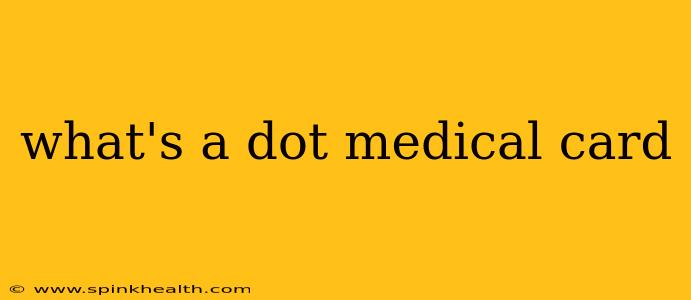What's a DOT Medical Card? A Journey into Commercial Driver Health
The world of trucking and commercial driving is a demanding one, requiring long hours, intense focus, and unwavering responsibility. Behind the wheel of a large vehicle lies a significant responsibility – the safety of yourself, your cargo, and everyone else on the road. That's where the DOT medical card comes in. It's not just a piece of paper; it's a symbol of fitness and a critical component of the intricate system ensuring safe commercial transportation.
Let's embark on a journey to unravel the mystery of this crucial document, exploring its significance and answering some common questions.
What is a DOT Medical Card, Exactly?
Imagine this: you're a truck driver, ready to embark on a cross-country haul. Before you can legally operate a commercial motor vehicle (CMV) involved in interstate commerce, you need something akin to a driver's license – but with a much stricter health check. That's precisely what a DOT medical card provides. It's a certification issued by a Federal Motor Carrier Safety Administration (FMCSA)-registered medical examiner confirming you meet the health standards required to safely operate a commercial vehicle. It's your official "green light" to hit the road legally.
What are the Health Requirements for Obtaining a DOT Medical Card?
This isn't a simple vision test and blood pressure check. The FMCSA sets strict standards to ensure drivers are physically and mentally capable of handling the rigors of commercial driving. These standards are designed to minimize risks associated with health conditions that could compromise safety. The medical exam is thorough and covers many aspects of your health, including:
- Vision: You must meet specific visual acuity requirements.
- Hearing: Your hearing must be sufficient for safe driving.
- Cardiovascular health: Your heart and blood vessels must be in good condition.
- Nervous system: Conditions impacting your reflexes and cognitive function are evaluated.
- Musculoskeletal system: Your ability to perform physical tasks related to driving is assessed.
- Mental health: Certain conditions that might affect judgment or decision-making are considered.
The examiner will review your medical history, perform a physical examination, and potentially order further tests depending on your responses and findings.
How Long is a DOT Medical Card Valid For?
The validity period of your DOT medical card depends on several factors, including your health status and age. Generally, cards are issued for periods ranging from one to two years. Drivers with certain health conditions might receive shorter-term certifications, requiring more frequent medical evaluations.
What Happens if I Have a Medical Condition?
Having a pre-existing medical condition doesn't automatically disqualify you from obtaining a DOT medical card. The FMCSA provides guidelines for various medical conditions, and the examiner will determine if you can safely operate a CMV with appropriate accommodations or treatment plans in place. Open and honest communication with your medical examiner is crucial in this process.
Can I Drive Commercially Without a DOT Medical Card?
No. Operating a CMV involved in interstate commerce without a valid DOT medical card is illegal and can result in significant penalties, including fines and suspension of your driving privileges. It’s a serious offense that compromises public safety.
How Can I Find an FMCSA-Registered Medical Examiner?
The FMCSA website maintains a searchable database of registered medical examiners. This is your go-to resource for finding a qualified professional in your area to perform your DOT physical.
The DOT medical card is more than just a permit; it's a testament to your commitment to safe driving practices. Understanding the requirements, the process, and the implications of having—or lacking—this essential document is critical for anyone operating a commercial motor vehicle. It's a vital part of a larger system designed to keep our roads safe for everyone.

